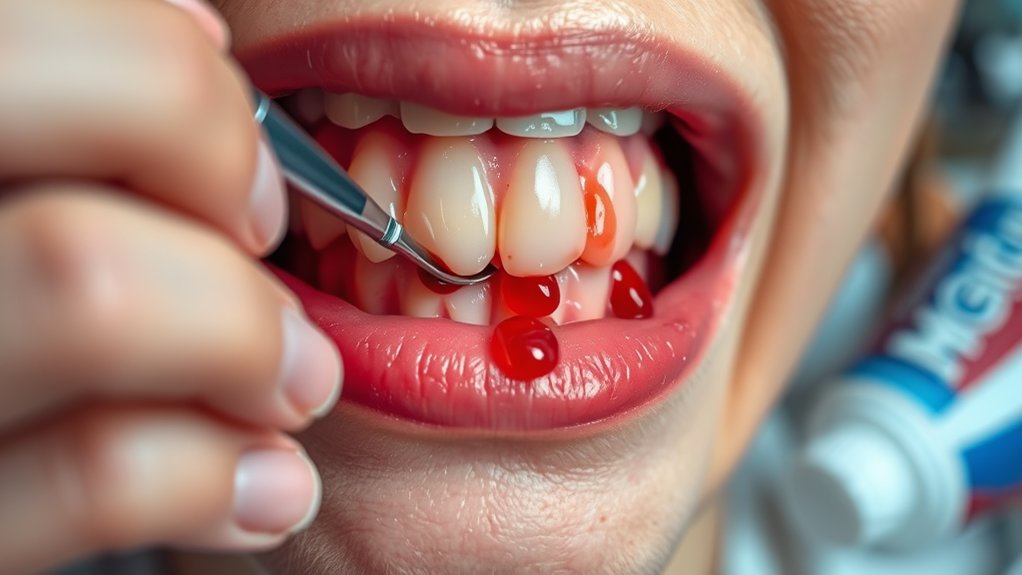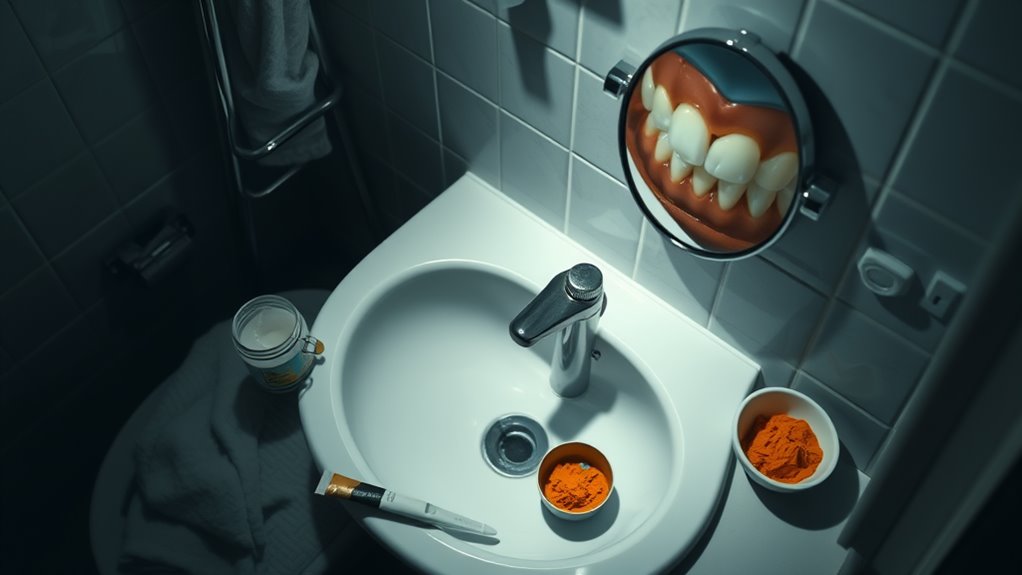Do You Need a Gum Detox. Signs to Watch For
You notice persistent redness, you experience swelling, and you deal with bleeding gums. These symptoms could indicate that your gum health is in jeopardy. Additionally, chronic bad breath or loose teeth might suggest deeper issues. Understanding what signs to watch for is essential, as early intervention can prevent serious complications. Are you aware of how gum detoxification could support your oral health and what benefits it can provide?
Key Takeaways
- Red, swollen, or bleeding gums are clear signs that you may need a gum detox to prevent gum disease.
- Frequent bad breath or a persistent bad taste can indicate harmful bacteria that a detox could help eliminate.
- Gum recession or loose teeth suggest underlying issues, signaling the need for a detox and possible professional evaluation.
- Increased gum sensitivity or discomfort may indicate inflammation that can be addressed through detoxification methods.
- Consistent oral hygiene and a balanced diet are crucial; reducing sugary snacks can also support gum detoxification efforts.
Understanding Gum Health
When it comes to maintaining overall oral health, many people overlook the importance of gum health. Healthy gums support your teeth and prevent serious issues like gum disease.
To ensure your gums are in good shape, consider a gum detox, which cleanses harmful toxins and promotes healing. Regular dental check-ups and proper oral hygiene can help maintain gum health. This includes brushing twice daily, flossing, and using an antimicrobial mouthwash. Additionally, nutritional intake plays a crucial role in supporting gum health and preventing issues such as bleeding gums.
Common Signs of Gum Issues
Several key signs can indicate potential gum issues, and recognizing them early is crucial for effective treatment.
Pay attention if you notice gum redness, swelling, or bleeding while brushing or flossing. Persistent bad breath or a bad taste in your mouth may also signal a problem.
Additionally, gum recession, where your gums pull away from your teeth, can indicate underlying issues. Loose teeth or changes in bite alignment can further highlight the need for attention. Early intervention is crucial to prevent long-term oral health damage associated with gum disease.
If you experience any of these symptoms, it’s essential to consult your dentist promptly to prevent the progression of gum disease.
The Importance of Gum Detoxification
Gum health plays a significant role in your overall oral hygiene, making gum detoxification a vital process for maintaining strong and healthy gums.
When bacteria build up in your mouth, they can lead to inflammation, gum disease, and other issues. Detoxifying your gums helps to remove harmful toxins and bacteria, giving your immune system a chance to restore balance.
Regular detoxification not only supports gum health but also promotes fresh breath and can enhance the effectiveness of your oral care routine. Additionally, being mindful of sugary snacks can significantly improve your gum health and reduce harmful bacteria.
Ultimately, prioritizing gum detoxification helps you maintain a healthy smile and prevent future dental complications.
Potential Benefits of a Gum Detox
A gum detox offers numerous benefits that extend beyond just improved oral hygiene. By removing toxins and accumulated plaque, you can reduce inflammation and promote healthier gums.
This process may also enhance blood circulation in your gums, leading to better nutrient absorption. You’ll likely experience fresher breath and a decrease in gum sensitivity, making eating and brushing more comfortable.
Additionally, a gum detox can help prevent gum disease and tooth loss over time. Overall, you’ll not only feel more confident in your smile, but you’ll also be taking proactive steps toward long-term oral health and well-being. Incorporating vitamin C-rich foods into your diet during this process can further support healthier gums and bolster collagen production.
Practical Tips for Healthy Gums
To maintain healthy gums, prioritizing your oral hygiene routine is essential. Brush your teeth twice a day with fluoride toothpaste, making sure to gently clean along your gum line.
Don’t forget to floss daily, as it removes plaque and food particles that can lead to gum disease. Incorporate an antibacterial mouthwash to reduce bacteria in your mouth.
Eat a balanced diet rich in vitamins and minerals, especially vitamin C, to support gum health. Stay hydrated and avoid tobacco, which can exacerbate gum issues. Additionally, be aware of the importance of regular dental check-ups as they help catch problems early, ensuring your gums stay healthy and strong.
When to Seek Professional Help
If you’re experiencing persistent gum inflammation, frequent bleeding, or chronic bad breath, it’s time to seek professional help. These symptoms often indicate underlying issues that require expert attention. Ignoring these signs can increase your risk of developing serious systemic diseases, so don’t wait for them to worsen; addressing them early can protect your overall oral health.
Persistent Gum Inflammation
While gum inflammation can occasionally improve with home remedies, persistent symptoms often signal the need for professional evaluation.
If you notice that your gums remain red, swollen, or tender despite trying over-the-counter treatments, it’s time to consult a dentist. Ignoring chronic inflammation can lead to more serious issues like gum disease or tooth loss.
Additionally, if your symptoms persist for more than a week, don’t hesitate to seek help. Keeping your gum health in check is crucial for your overall well-being, so be proactive and schedule an appointment for a thorough examination and personalized treatment plan.
Frequent Bleeding Issues
Experiencing frequent bleeding from your gums can be alarming, especially when you brush or floss your teeth.
It’s crucial to take this symptom seriously, as it may indicate underlying issues like gum disease or other oral health problems. If you notice persistent bleeding, don’t hesitate to schedule a visit with your dentist.
Seeking professional help early can prevent more severe complications down the line. Your dentist will assess the condition of your gums and recommend appropriate treatment options.
Chronic Bad Breath
Chronic bad breath, also known as halitosis, can be a significant social concern and might signal underlying health issues.
If you notice persistent bad breath despite practicing good oral hygiene, it’s time to seek professional help. This condition could indicate gum disease, tooth decay, or even systemic illnesses. A dental professional can perform an assessment to identify the root cause of your halitosis.
Early intervention is crucial, as untreated dental or health problems can worsen. Don’t let chronic bad breath affect your confidence; consult with a dentist to address this issue and regain your freshness.




